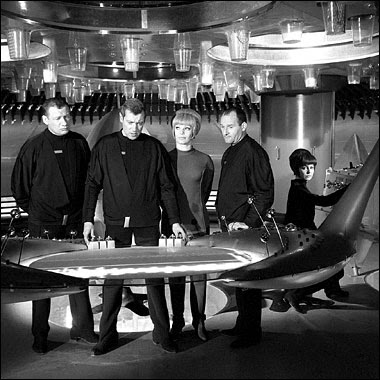 Sad news. The German science fiction icon, Eva Pflug, has died. Her ultra-modern TV series, Space Patrol, which began the year of my birth, 1966, was the Star Trek of Germany, with all that entails. I didn't know of the show at the time, of course, but came across it 30 years later, in 1996, when I was working for a TV production company in Montreal, Canada, that had been hired to translate the series into English, for possible broadcast on a dedicated science fiction channel in the US. I did some work on the show, and got to know her work then. This retro-memory, like most kitsch, leaves a bitter-sweet taste. Now, 12 years later, 30 seems as far away as some interstellar planetoid - and as likely. Time bends, indeed.
Sad news. The German science fiction icon, Eva Pflug, has died. Her ultra-modern TV series, Space Patrol, which began the year of my birth, 1966, was the Star Trek of Germany, with all that entails. I didn't know of the show at the time, of course, but came across it 30 years later, in 1996, when I was working for a TV production company in Montreal, Canada, that had been hired to translate the series into English, for possible broadcast on a dedicated science fiction channel in the US. I did some work on the show, and got to know her work then. This retro-memory, like most kitsch, leaves a bitter-sweet taste. Now, 12 years later, 30 seems as far away as some interstellar planetoid - and as likely. Time bends, indeed.
 Sad news. The German science fiction icon, Eva Pflug, has died. Her ultra-modern TV series, Space Patrol, which began the year of my birth, 1966, was the Star Trek of Germany, with all that entails. I didn't know of the show at the time, of course, but came across it 30 years later, in 1996, when I was working for a TV production company in Montreal, Canada, that had been hired to translate the series into English, for possible broadcast on a dedicated science fiction channel in the US. I did some work on the show, and got to know her work then. This retro-memory, like most kitsch, leaves a bitter-sweet taste. Now, 12 years later, 30 seems as far away as some interstellar planetoid - and as likely. Time bends, indeed.
Sad news. The German science fiction icon, Eva Pflug, has died. Her ultra-modern TV series, Space Patrol, which began the year of my birth, 1966, was the Star Trek of Germany, with all that entails. I didn't know of the show at the time, of course, but came across it 30 years later, in 1996, when I was working for a TV production company in Montreal, Canada, that had been hired to translate the series into English, for possible broadcast on a dedicated science fiction channel in the US. I did some work on the show, and got to know her work then. This retro-memory, like most kitsch, leaves a bitter-sweet taste. Now, 12 years later, 30 seems as far away as some interstellar planetoid - and as likely. Time bends, indeed.
Comments